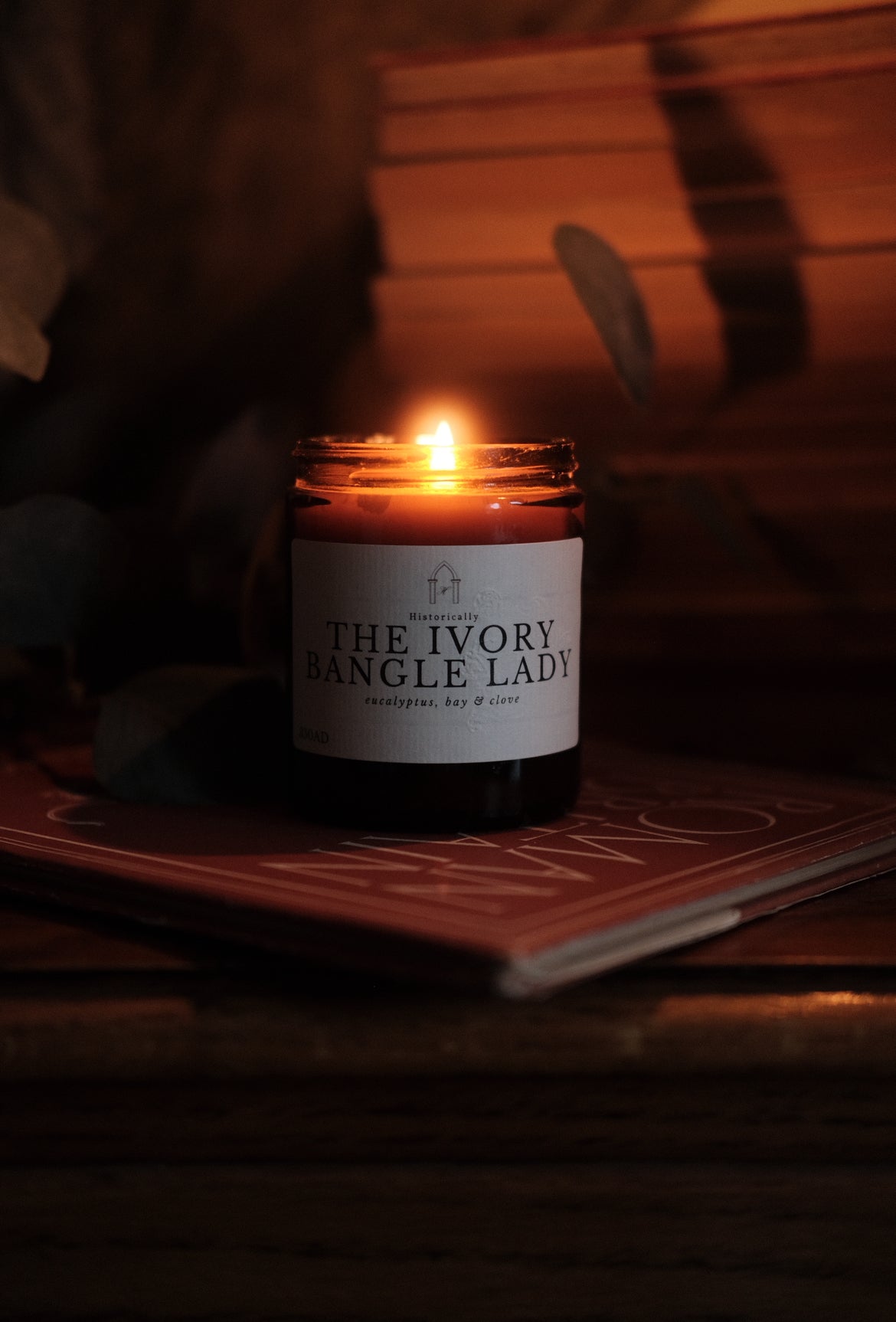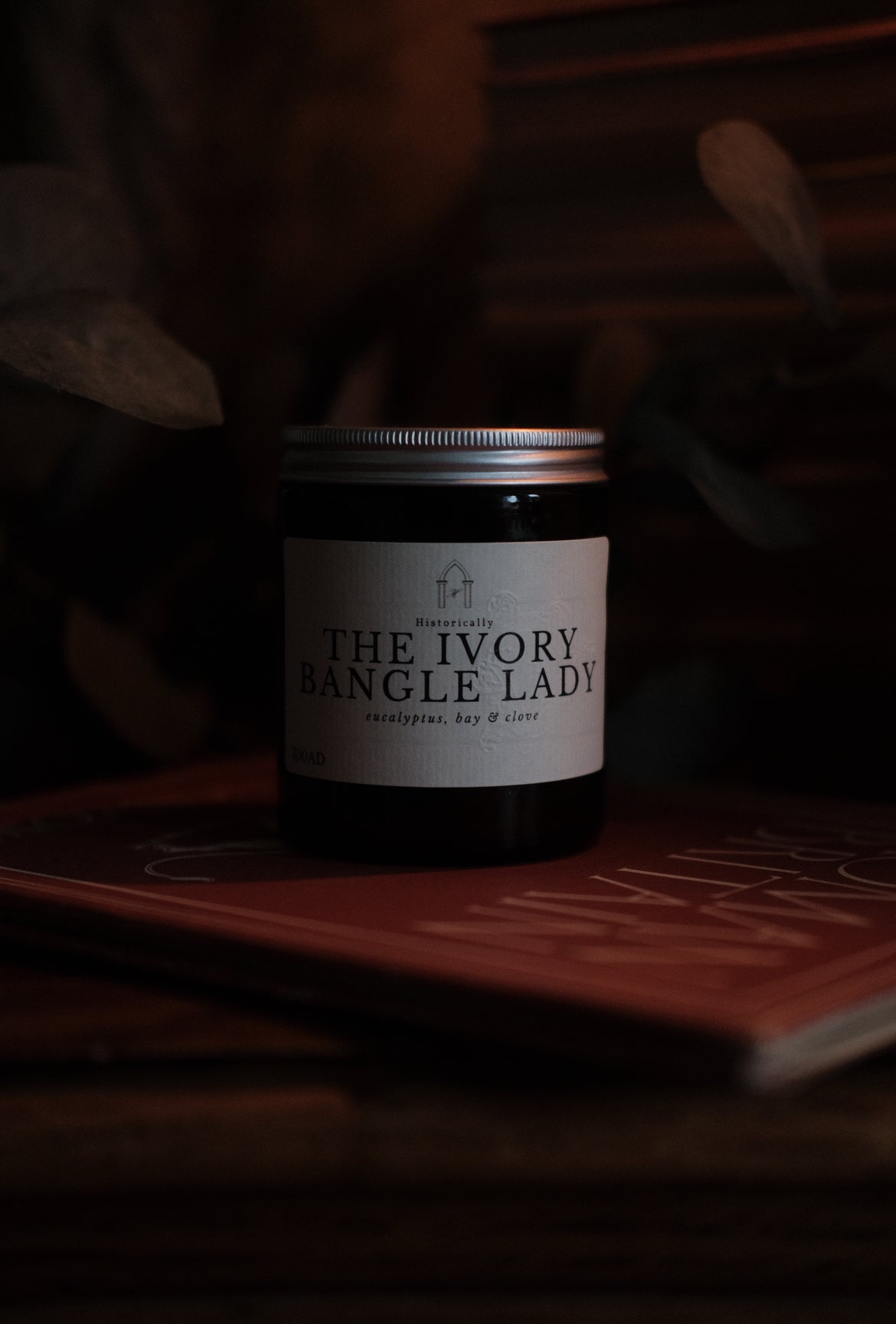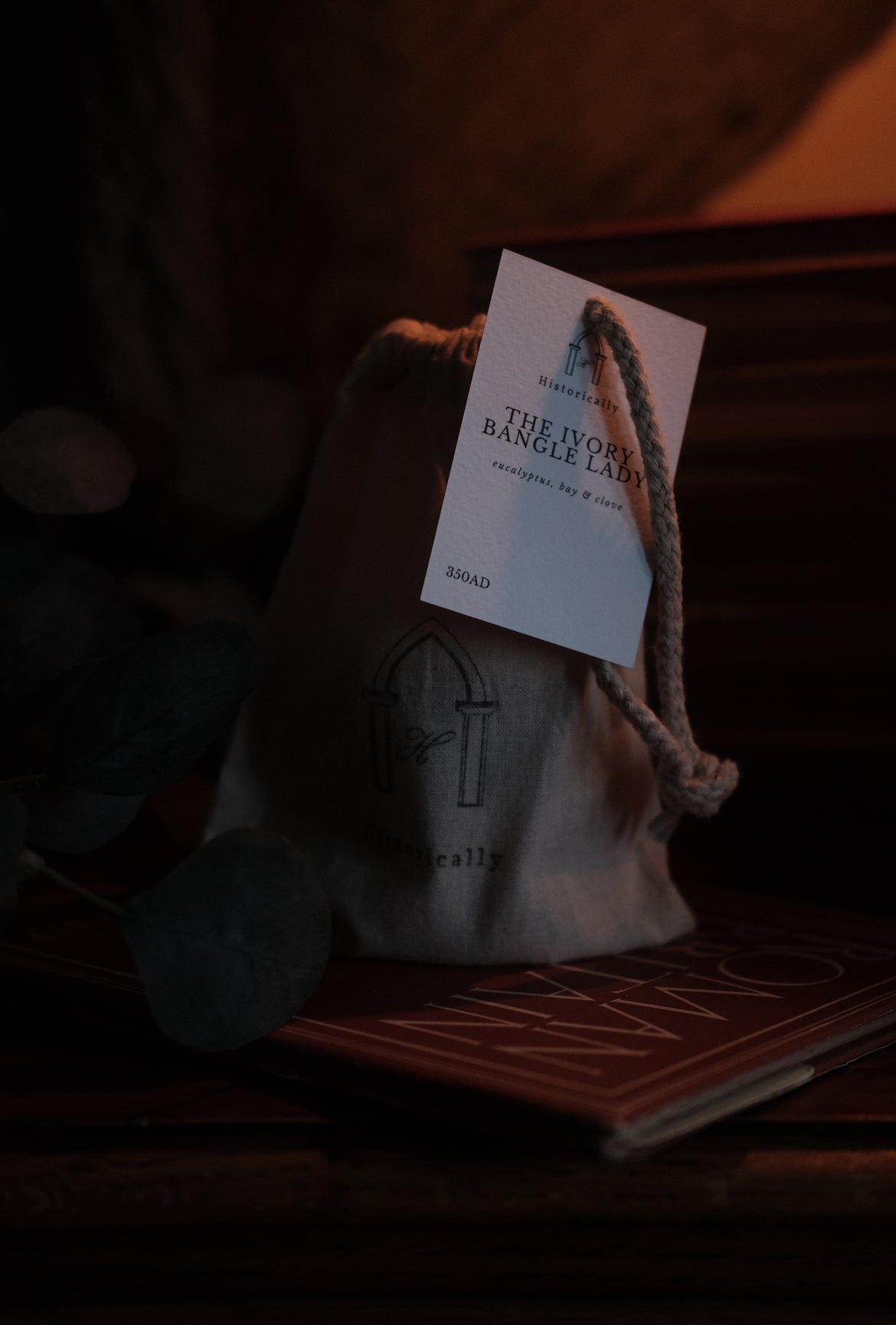Historically
The Ivory Bangle Lady
The Ivory Bangle Lady
Couldn't load pickup availability
A tribute to the Ivory Bangle Lady, a woman of elegance and power in Roman York.
Eucalyptus unfurls with cleansing clarity, while bay—once steeped in sacred baths and whispered of as a ward against illness—wraps the air in protective warmth. Clove, prized by Romans for its sharp vitality, lends a spiced richness. Together, they weave a fragrance both opulent and restorative, honouring her legacy of strength, beauty, and enduring mystery.
The Ivory Bangle Lady is a skeleton of a high-status adult female, potentially of North African descent, who died in York in the 4th Century AD. Found in 1901 she was found buried with many beautiful examples of Roman jewellery including ivory and jet bangles.
Share
Scent Notes
Scent Notes
eucalyptus, bay & clove
Delivery & Returns
Delivery & Returns
Dispatch times
Our candles are made to order and most will take between 1-7 business days to dispatch.
However, if you are wanting your order sooner or for a specific date please get in touch (via email or in the message box at checkout) and we can sort something out for you!
Delivery Times
We currently offer standard delivery with Royal Mail 2nd class which should arrive between 2-3 days after dispatch and Royal Mail 1st class which should arrive between 1-2 days after dispatch.
NOTE: Please note that during the months of November and December we use Royal Mail Tracked. This is more expensive than normal but we have found means that your parcels are safe and get to you in time.
Shipping outside the UK
We are more than happy to ship to America and Australia, unfortunately we cannot ship to the EU at this time.
If you would like an order to be delivered to Australia please do not hesitate to contact us via our contact page, email or Instagram message and we will calculate the shipping costs for you and complete your order via invoice.
Please note that customers are responsible for paying any import VAT, taxes and fees.
What is your return policy?
Please note earrings cannot be returned and refunded for hygiene reasons.
We are happy to accept returns if you are unhappy with your purchase.
Contact us within: 14 days of delivery
Dispatch items back within: 30 days of delivery
Request a cancellation within: 24 hours of purchase
Buyers are responsible for return postage costs. If the item is not returned in its original condition, the buyer is responsible for any loss in value.
Item damaged in transit
Sometimes accidents happen.
If you receive a parcel that has been damaged in the post please send a picture to us showing the damage within 48 hours of your parcel being delivered and we can discuss options with you. No worries.
Safety Information
Safety Information
Contains Eucalyptol, beta-Caryophyllene, d-Limonene, Linalool, Linalyl acetate. May cause an allergic skin reaction.
I. Keep candles away from curtains, fabrics, furniture, and draughts.
II. Avoid placing candles under shelves; maintain a 3-foot (1-meter) clearance above.
III. Prevent contact with clothes and hair; place candles out of reach.
IV. Keep children and pets at a distance from candles.
V. Maintain at least 4 inches (10cm) between burning candles.
VI. Extinguish before moving; avoid objects falling into hot wax.
VII. Never leave burning candles unattended.
VIII. Safely extinguish with a snuffer or spoon, not by blowing.
IX. Double-check to ensure candles are completely out.
Scent History
Scent History
Eucalyptus:
Eucalyptus, a genus native to Australia and Tasmania, has a long history rooted in traditional Aboriginal medicine, where its leaves were used for treating wounds, fevers, and respiratory ailments. European explorers encountered the tree in the 18th century, and by the late 1700s, seeds were brought to Europe, where eucalyptus was cultivated for its timber, drainage capabilities, and medicinal properties. In Britain, it gained popularity during the Victorian era amid a surge of interest in botany and natural medicine, with eucalyptus oil prized for its antiseptic and decongestant qualities. British physicians used it in cough remedies, inhalants, and disinfectants, especially during influenza outbreaks in the 19th and early 20th centuries, while its silvery leaves made it a favorite in botanical gardens and conservatories. During both World Wars, eucalyptus oil was used in Britain for medical and disinfectant purposes, and by the mid-20th century it had become a common household remedy found in lozenges, balms, and cleaning products. Today, eucalyptus remains widely appreciated in Britain for its aromatic, medicinal, and cleansing properties, reflecting a lasting legacy that connects its Australian origins with British traditions of botanical healing and innovation.
Bay:
Bay (Laurus nobilis), or sweet bay, is an evergreen tree native to the Mediterranean with a history rich in symbolism, medicine, and culinary tradition. In ancient Greece and Rome, it was sacred to Apollo and symbolized victory, wisdom, and protection, with wreaths made from bay leaves crowning poets, heroes, and athletes—a legacy that inspired the term “laureate.” The Romans introduced bay to Britain, where it became valued for both its fragrance and practical uses. In medieval and Tudor England, bay trees were cultivated in monastery and manor gardens, their leaves burned or strewn on floors to purify the air and ward off evil, while also flavoring stews and meats. During the Elizabethan era, bay symbolized honor and protection, often adorning homes during celebrations. By the 18th and 19th centuries, it had become a common feature in British kitchens and gardens, used in cooking, potpourri, and home remedies, and admired for its ornamental beauty in conservatories. Today, bay remains a cherished culinary herb in Britain, valued for its aromatic flavor and enduring associations with health, victory, and protection.
Clove:
Clove, renowned for its aromatic and pungent flavor, boasts a storied history dating back thousands of years. Native to the Maluku Islands in Indonesia, cloves were among the earliest traded spices globally, prized both as a culinary delight and for their medicinal properties. In ancient China and India, cloves were valued for their potential to address dental, digestive, and respiratory ailments, with clove oil being a key component in traditional remedies. Their journey along ancient spice routes popularized cloves across Europe during the Middle Ages when they were considered a luxury spice due to high demand and cost. In recent history, global clove production expanded, making this spice accessible worldwide. Today, cloves are integral to various cuisines, offering depth to dishes, and are used in dental care products, perfumes, and traditional smoking blends. This enduring appeal showcases cloves' rich history and their role in the global spice trade and cultural exchange.






